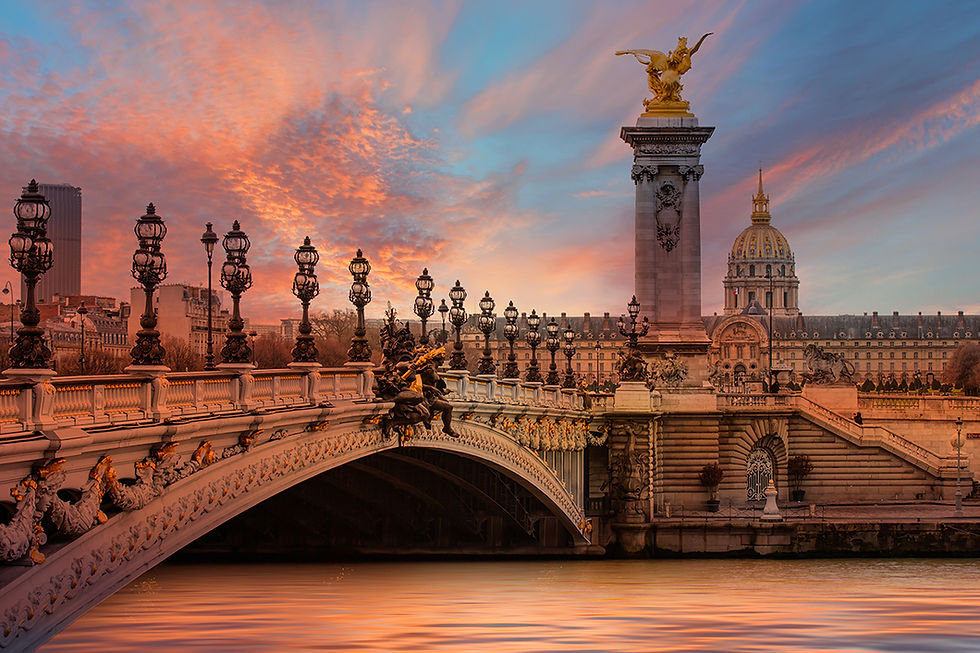Confidence and Safety

The rooftop of Les Invalides, Paris, France. Photograph: Vaivirga @ Adobe Stock.
In the second of a two-part series, Josh Chandler shares his experiences relating to the importance of language and comprehension for solo travellers.
A misunderstanding in Montparnasse
By Josh Chandler
It all began harmlessly enough. Though I had visited Paris many times before, this stay was potentially longer-term because I was considering a job offer and getting to know the city in a more intimate way. I had decided to spoil myself with an evening at the cinema in Montparnasse, not far from where I was staying. The screening had ended, and I was casually making my way through the foyer and toward the doors leading onto the Boulevard du Montparnasse. I don’t remember the film but loving cinema as much as I do (especially French cinema), my imagination and my senses would have been overwhelmed.
From the dusty, but reliable, database of my memories of this time, I recall a man near the exit doors suddenly attempting to prevent me from leaving the building. A harmless enough gesture, his arm reaching toward to me to attract my attention, and a short (and what I later came to learn) urgent attempt to communicate something to me. In French. I don’t like being touched, and in this suddenly intense situation – being grabbed and yelled at – the fundamental ability of my brain to comprehend what was happening, and how to respond, simply evaporated.
Is there a more pointless reaction to any given situation than ‘panic’ – that sudden, uncontrollable fear and anxiety, that only ever results in wildly erratic responses and behaviour? And yet when panic arrived, it did so swiftly and completely. I shrugged the man off my arm and moved what I considered to be a safe distance from him. The small group of people who had obediently remained corralled together in the foyer were calm, and their expressions were not necessarily of concern, but of a sad, disconnected bewilderment.
The man’s voice became louder and his tone more direct, while my wordless responses became more indignant and determined. I was leaving the building, whether he wanted me to or not. The perfect combination of fear and ignorance had resulted in my stubborn and inflexible insistence. He reluctantly unlocked one of the exit doors, and I stumbled – liberated – out onto the pavement, where I heard the doors behind me being locked again. What on earth, I wondered, had all that been about?! But, needless to say, I didn’t have to wonder for very long.
Of all the citizens in the world, the French do civil disobedience more spectacularly than anyone else. In France, civil disobedience is not just a political tool, it often appears to be interpreted, and fearlessly upheld, as a civic duty. From the storming of the Bastille in 1789 (a powerful symbol of the French Revolution), to the mass student and worker protests of May 1968 that nearly brought the country to a halt, French citizens have long demonstrated an extraordinary commitment to the imperatives of powerful and confronting collective resistance.
And now, my own little civil disobedience ‘concert’ in the foyer of a cinema, had landed me directly in the path of one of the largest, loudest, and angriest street protests I had ever witnessed. Like most mass gatherings of enraged people, I could hear it approaching well before I could see it. My immediate reaction was to rush back to the doors into the cinema foyer, where my previously imagined adversary simply shrugged and shook his head. I have often wondered why he made that choice. Clearly, I was a liability – a point made to me when I was safely at home later that evening. “Why hadn’t I just told him that I didn’t speak French and that I could not understand what he was saying?”
Even the most experienced and capable solo travellers carry a quiet, deep-seated anxiety within us everywhere we go – a perfectly natural tension between caution and curiosity. It’s the constant undercurrent – no matter how confident and prepared we are – of not knowing exactly how things work or, in this case, how to navigate misunderstandings. In a foreign place, even common everyday experiences such as finding a meal, asking for directions, or catching a bus, can feel loaded with the pressure of ‘getting it right’. That constant and slow-burning uncertainty isn’t weakness, it’s our instinct sharpening, and our awareness expanding to learn, remember, and understand about how to meet moments (such as this one), with confidence and surety. Acknowledging that this anxiety exists – and learning from it – is an essential part of our growth as solo travellers.
Josh Chandler is a freelance writer based in the United Kingdom. You can read the first part of this two-part series ‘How safe are we travelling in the world in 2025?’ here.

The Alexandre III Bridge across The Seine, Paris, France. Photograph: Muratart @ Adobe Stock.
Travelling ‘solo-smart’ beyond Bonjour!
Start with survival, not small talk: Polite phrases like “Hello” and “Thank you” are useful, but in a moment of confusion or danger, survival phrases matter more. Prioritise what will help you get clear and calm assistance. You can be polite once you’re safe.
Carry a language card: A card in your wallet with the name of your native language, written in the languages of the countries you’re visiting, is a simple, essential tool. Flag badges and pins can help, but only if someone recognises them. In a crisis, clarity beats symbolism – it’s not a quiz, and it may be an urgent moment where words matter most.
Learn and rehearse key safety-related phrases: Focus on functional phrases, the most important of which are “I’m sorry, but I don’t speak [French, in this case], do you speak [English]”, “Is there someone here that speaks [English]?”, and “I need help to understand”. These lines can unlock kindness and assistance and help avoid confusion or conflict. Pair them with a shrug, a puzzled look, or an open expression. Practise with a friend or app. And remember, your tone and body language often say more than perfect pronunciation.
Keep key phrases handy: Memorise or carry a few essential phrases like “I don’t understand” and “Can you help me?”. If pronunciation is tricky, write them phonetically. Carry a small card in the local language with your accommodation address, as it can help hotel staff, shopkeepers, or drivers speak on your behalf if necessary.
Body language is your backup: Non-verbal cues are universal. Read faces, postures, and tone before reacting. Look around, because your ally may not be the person speaking to you. Stay aware of your own body language too – calm, open, and prepared wins more trust than panic or defensiveness.
Pause, listen, and scan the space: Don’t rush to respond if you don’t understand someone. Take a breath, use one of your prepared phrases, and look around. You may be focused on one person, but someone nearby could already be listening and ready to help. Often, the answer is in the room, and you just need to remember to slow down to notice it.


